In 2001 guitarist Paul Austin left the Boston-based alternative rock collective Willard Grant Conspiracy he had co-founded with vocalist Robert Fisher and moved to Seattle. Shortly after his move, he formed another project, The Transmissionary Six, with The Walkabouts’ drummer and percussionist, Terri Moeller. The Transmissionary Six put out its self-titled, self-released debut album without any great expectations the following year. A moderate success, it paved the way for much of what was to follow with Austin’s brooding guitar lines and atmospheric sound effects and Moeller’s crystal, enigmatic vocals having a haunting effect. The Transmissionary Six would go on to record another six albums, ‘Go Fast for Cheap’ (Return to Sender, 2002), ‘Spooked’ (FILM Guerrero, 2003), ‘Get Down’ (FILM Guerrero, 2004), ‘05.21.05’ (Glitterhouse, 2005), ‘Radar’ (Glitterhouse, 2006) and ‘Cosmonautical’ (Tarnished Records, 2008). At the time of ‘Radar’ The Transmissionary Six expanded from a duo into a three-piece with the induction of multi-instrumentalist Jon Hyde (pedal steel, electric guitar, piano, organ) into the line-up. Austin also joined The Walkabouts in 2010, remaining with them until they wrapped up touring and recording in 2013. The Transmissionary Six bowed out quietly in 2013 shortly after the release of a compilation album, ‘Selected Songs 2002-2012 ’(Skok), which came out originally on fifteen-track CD in 2013 and then again, after the band’s break-up, on red wax vinyl in 2016. The vinyl edition was curated by The Walkabouts’ frontman, Chris Eckman. They returned with a typical lack of fanfare and fuss with a single, ‘Point Defiance Landfall’, last year. When that and its video attracted some interest, they recorded another single, ‘The New New Thing’, and now have released an album, ‘Often Sometimes Rarely Never’, which came out on CD on April 1st on Walkabouts’ bassist Michael Wells’ label, Drums & Wires Recordings. (Wells also plays bass on four of the album’s nine songs.) ‘Often Sometimes Rarely Never’ finds Moeller (who now goes under her married name of Pearson), Austin and Hyde joined by Girl Singer vocalist Carolyn Wennblom on backing vocals. Multi-instrumentalist Matt Brown (electric guitar, lap steel. keyboards and bass), who engineered and mixed it, also appears on every track, and there are guest appearances from Eckman, Green On Red keyboardist Chris Cacavas and acclaimed New York viola and session player Deni Bonet. The new album opens evocatively with the comeback single ‘Point Defiance Landfall’ and slowly ringing, soaring guitars; sturdy-sounding drumbeats and a dreamy drawl of a vocal from Pearson. It is followed by the strident pop of the second release ‘The New New Thing’. Other highlights on the nine-track record include the reflective ‘Sudden Movements’, which is enhanced by Bonet’s softly surging viola work, and the similarly contemplative ‘Blessed by Fireworks’, which features sparse, tingling keyboards from Cacavas. Eckman, backed by Pearson and Wennblom, takes lead vocals on the sultry ‘Strobe Light Nights’. The hazy ‘No One and Done’, with its echoing guitar work and chiming chorus line, is another stand-out moment, and the album is closed with the fragmentary, piano-led ‘The Night Won’t’. In his third interview with Pennyblack, and first to discuss ‘Often Sometimes Rarely Never’, we spoke to Paul Austin extensively about The Transmissionary Six, the new album and songwriting with Robert Fisher, Chris Eckman and Terri Pearson. PB: The Transmissionary Six had recorded six albums and then put out the 'Selected Songs' compilation and after that just seemed to vanish. Was that really the case? Why did you take such an extended hiatus of almost a decade and why have you decided to come back now? PAUL AUSTIN: Well, I don’t know if I’d call it a hiatus, because that implies we planned on coming back! And after the compilation you mention, it just seemed like a nice time to… stop, I guess. We were a small band, with a small following, and no record label or booking agent - so any activity beyond the occasional writing and sharing of new music online didn’t seem doable. We’d put out a few well received records, and we’d toured Europe four times - although regrettably we never found a UK booking agent, so never visited the UK - once as a support act, and three times as a compact trio stuffed into a car with all our gear. We accomplished much more than we ever thought we would and felt pretty fortunate. It seemed like a good idea to end on a high note. We did keep getting together once every year or two for a low key, local show, but as a recording and touring band… we felt done. Which is okay; everything has a natural life span. PB: You self-released your first eponymous album and then were on the somewhat short-lived but superbly packaged FILM Guerrero and Tarnished Records as well as Glitterhouse. You're now on Drums & Wires Recordings, which is run by Michael Wells, who was the bassist in The Walkabouts. It seems to be a label run by friends for friends. Is that an accurate description? PA: It’s Michael’s label; he wanted to create a hub online that would collect music made by friends that wasn’t necessarily available anymore, or at least wasn’t easy to find. He assembled a destination website where people could visit and, for example, look for a Seattle based artist’s twenty-year-old CD. He built a catalogue; although he‘s helped some folks with the release of new stuff - as he did with us - building a deep catalogue was, and is, a large part of it. He also put a lot of this music up on the streaming services, which didn’t exist when many of these records and CDs first came out. It was a lot of work, a real labour of love. PB: How big a factor was Drums & Wires in your decision to return? PA: I’d say it wouldn’t have happened without Michael. Terri and I had talked about new Transmissionary Six music now and again over the past several years, but never acted on it; we kind of just kicked the can down the road, so to speak. To launch Drums & Wires, Michael released a compilation titled ‘Songs Collected’, featuring new or at least previously unreleased tracks from about a dozen bands he was offering catalogue titles for via his website. And he asked us to do it; he really wanted us to participate. But I told Terri, “I just don’t think I have any more music in me. I kinda think I’m done, you know?” So we declined, and the CD came out without us participating. But it got me thinking, “Maybe I do have some music left in me.” I had sold all of my musical equipment during a jobless period, so I had to get a guitar again. To get things rolling, Terri and her husband actually bought me an acoustic I could play, which was just really sweet of them. I put a little demo together that became ‘Point Defiance Landfall’ after we re-recorded it and Terri wrote and added lyrics. We did a homespun video and shared it. The song got a really warm reaction, much more than we anticipated. So we thought, “Well, y’know, maybe we should try another one? People seem really interested!” And we wrote and recorded ‘The New New Thing’ and went through the same process. By then it felt like the creative gears were grinding again… so we just kept going! But getting back to your question, it was Michael starting his label that planted the seed. For sure. And here we are. PB: You must have had to do a lot of relearning with the guitar that Terri and her husband gave you. Was there an element when you were making ‘Often Sometimes Rarely Never’ that you felt you were starting from absolute scratch? PA: No, not really… I actually found that assembling the basics for new Transmissionary Six songs came really quickly once I finally dived in. I’ve always had a certain way I’d like Transmissionary Six songs to feel, a particular vibe, and it all came back a lot faster than I was expecting. I was probably more surprised than anybody! We have a pretty straightforward process when we make Transmissionary Six music, and a large part of it is simply finding the right people to play with and then giving them ample room to contribute. I likely contribute less than you think I do! We were lucky in that Jon Hyde, who has joined us on pedal steel as well as numerous other instruments going back to 2004, jumped back in on this new record as well. He’s a much more accomplished player than I am, and he adds so much colour. For some reason, the way I put songs together really works for Terri to write lyrics to and sing to; once we’ve got that, Jon is terrific at adding additional instrumentation that fits the mood of the song. He makes great choices, which really elevates everything. On the new album, my housemate Carolyn Wennblom added harmony vocals on the first song, and just kept going… she ended up on all of them. Everyone just naturally carried the songs forward. PB: What's Carolyn's musical background? You and Terri contributed to the 2011 album she released as Girl Singer, 'Tell Her What's She Won'? PA: Carolyn has been part of the Seattle music scene since the 1990s. Although her participation has been mainly as a backing/harmony vocalist - which is by far her favourite role - she did release a solo album on the Glitterhouse label in 1997, ‘Bees to the Honey’. During the period after The Transmissionary Six wrapped it up., Terri released material as Terri Tarantula,, and Carolyn accompanied her for live shows. We got to talking about what it would be like for Carolyn to give a follow-up album of her own a try - just to see where it goes. And we decided to do it. Carolyn contributed a couple of songs, and Terri and I contributed a few. There were a handful of covers as well, which we tried to pull from non-obvious sources; the Mountain Goats, Notwist, folks like that. The record was done with our friend and go-to studio guy since 2006, Matt Brown, engineering and mixing. Matt had a prominent role playing on the tracks as well. My favourite two songs on the album, ‘Sideshow’ and ‘Injury Wants An Encore’, were both written by Terri, words and music. Rather than record them herself for her Terri Tarantula solo project, she graciously offered both for Carolyn’s album. I’m really glad she did, as - to me, at least - they are the songs Carolyn most fully settled into, and came up with superb, nuanced vocal performances. For someone who had been singing harmony/backing vocals exclusively for so long, it was interesting to try and find the sweet spot, what she sounded like as a lead vocalist, what her tendencies were. Those two songs, along with a few others, are definite favourites. The backing musicians were pretty much the Transmissionary Six gang. I do wish I had worked harder writing or gathering songs like that - songs she could really inhabit - but, well, that’s hindsight for you. At the time, it was more a “fast and fun” project. PB: Is there ever likely to be a second Girl Singer album, given Carolyn's preference for doing backing vocals? PA: I’d say that’s in all likelihood a no. The lead singer role just isn’t something Carolyn is drawn to. Coming up with backing harmonies - which she did on every song on ‘Often Sometimes Rarely Never’ - is what really brings her joy when making music, and that’s what she wants to be doing. Although… she did recently mention a one-off cover song she might like to sing, so who knows if she’ll decide she wants to do something like that, just for the fun of recording and sharing it? I hope so! A full album though? No, not likely. PB: Who is Matt Brown, the other multi-instrumentalist and main player on the album, and who also mixed it? PA: Matt is a producer/engineer/musician friend here in Seattle who has mixed - and often engineered and played on - almost everything we’ve done since we met him in 2006. He’s done a few other things I’m sure you’ve heard - tracking the final Walkabouts studio album, ‘Travels in the Dustland’, mixing the live ‘Berlin’ album from that tour, Terri’s 10” vinyl solo EP, and a lot with his former band Trespassers William. He does movie scoring as well - he’s a pretty busy guy. He mixed our entire new album at his studio, Space Ranch. I can’t stress enough how much his mixing skills shaped this record; it wouldn’t be overstating things to say that what his instincts and abilities brought to the songs was simply transformative. Back in 2006 we had been recording with producer Tucker Martine (who recently won a well-deserved Grammy!), and Tucker was unavailable to do a one-off. He recommended Matt as a talented studio guy and great person to work with, and both have for sure been the case. In 2006 ‘MOJO’ magazine contacted us and asked us to choose and then cover a song originally released in 1976, for the cover-mount CD on a July ‘Spirit of ‘76”’ issue. That was the theme. We figured most bands would go for punk rock or obscure stuff, so we recorded Gary Wright’s ‘Dream Weaver”’ We knocked it out in an afternoon, and to date it’s still one of my favourite vocals Terri has done. ‘MOJO’ kept pushing us for it - there was a hard deadline - and we sent it off. We then heard almost immediately that Arthur Lee of Love had died, and the whole “‘76” concept was scrapped in favour of a tribute cover-mount CD to him. And since the concept of the ‘Spirit of ‘76”’ concept was tied to July… well, that was that. None of it came out. We did recently post the song on Soundcloud, and I’m still really proud of it! Anyway, since then - almost twenty years ago, wow! - we’ve been working with Matt in the studio, and he’s contributed instrumentally as well. He’s pretty much our go-to guy for any projects that come up - which had largely been one-off songs since 2012 until we made this new album. PB: To pick on your earlier point that "I likely contribute less than you think I do!," you just contribute acoustic and electric guitar to ‘Often Sometimes Rarely Never’, and there are none of the field recordings, loops, 'junk' and other instruments that you brought to the other Transmissionary Six albums. Do you see yourself as more with this album than any other Tranmissionary Six album, as you used to do with Willard Grant Conspiracy providing the backline and basic tune for the other musicians to add to, provide texture for and to build upon? PA: It was a temptation on those early records to pack songs with strange little events and oddness, almost to the point of obscuring the songs a bit. After a while, you feel more secure about letting songs out into the light. For this new album, the latter was the case. We took care to make it a very textural album, but tried to follow a rule that everything in a song truly needed to be there, and had a purpose. We spent more time on the texture of the instrumentation - tape echo or vibrato on the guitars, distortion on the electric piano - to get to that place where the record feels very tactile. PB: Despite you having more musicians on this than any other Transmissionary Six record, this seems possibly to be your most economical record as everything had to have a place. What was your criteria in light of that for inviting in the guest musicians? PA: I’ll borrow a quote from Mark Eitzel, when he was asked a similar question: “I think you’re assuming much more forethought than there actually was.” It certainly fits as an answer here as well! Truthfully, although similarities in approach ultimately emerged, we didn’t have a plan. Most bands write a batch of songs, and then go in the studio and record them all together. We took it one at a time… we’d write a song, record it, mix it - and then start over with the next one. Since it was a core group recording the songs - Terri, Jon, Carolyn, myself, and Matt Brown - there was a natural consistency. But a few songs ended up with a featured guest. The circumstance was different for all three. An example would be Deni Bonet. I knew her by name from the Robyn Hitchcock ‘Storefront Hitchcock’ movie, and that she had done studio work for folks like R.E.M. and Sarah McLachlan. She was also in the Mountain Stage backing band for years, playing sets with guests such as Warren Zevon and Richard Thompson. It never would have occurred to me to contact her, though. But we had finished recording ‘Sudden Movements’, and I found myself wishing it had another element - maybe something that wouldn’t appear anywhere else on the album. So… one Friday morning, I was reading ‘The New York Times’, and there was an article having to do with the COVID pandemic. Specifically, it was a winter day and there was a very long line of people waiting to get tested at this one location in New York City. Folks lined up out in the cold for an hour or so, that kind of thing. And the journalist interviewed a few of them, the point of the article being these folks were really making the best of it - chatting and getting to know each other, holding someone’s place in line so they could run for a coffee, things like that. And one of the people interviewed in line was named… Deni Bonet. I was thinking, “That’s got to be the same person.” So, I looked online, and sure enough found her website. I sent her an email with a rough mix of the song and asked if she’d be into adding viola or violin. I put my phone number on there so she could call or text, although to be honest I expected an email response - if any response at all. About an hour later, I had just walked into a grocer; my phone rang and it was her. It was so loud in there I could barely hear her, so I quickly locked myself in the men’s room for some quiet. She said she really liked the song, she’d be happy to do it, and she quoted a modest fee. I said, “Just do your thing; we don’t have any preconceived ideas for this. Whatever feels right to you is fine. And… uh… is there any way you could do it by tomorrow?” This was Friday, and we had hoped to do a final mix on Sunday! And sure enough, the next afternoon her recording arrived, done at a nice studio she has access to. She usually charges per track, and we only talked about one track of viola or violin. But she liked the song a lot, heard a three-part string section at the end, and just went ahead and added two additional viola tracks without any extra cost. What you hear on the song is exactly what she sent us - we did no editing or anything. She just listened, reacted, and played something that really served the song, from a single viola at the outset to a string section as the song is winding down. I mean, she’s just so good. As for Chris Cacavas playing the Rhodes piano on ‘Blessed by Fireworks’, that was a different scenario. We have a lot of mutual friends but had never done anything together. It felt like that song would really benefit by being built on a piano, to give folks a rest from the acoustic guitar. I recorded the song on my phone, in the exact rhythm and structure I was hoping for, and asked him to just replicate it on a Rhodes with some overdrive on it, to really give it some grit. He said sure, did that, sent it back to us - he lives in Germany - and we built ‘Blessed by Fireworks’ on that track. I don’t even play on it! PB: You have a four-sixths Walkabouts reunion on ‘Often Sometimes Rarely Never’ with ‘Strobe Light Nights’ because Michael Wells also plays bass on that track. Chris Eckman, who is the other guest on the record, has in some ways been a mentor to The Transmissionary Six. PA: I’ve never thought of that before, but I can see that, yeah. He’s certainly someone Terri and I look up to as a songwriter, band leader, and producer. PB: He came up with the final track listing for the vinyl version of ‘Selected Songs’. Why did you ask him to choose the tracks for this and not choose them yourself? PA: Chris curated the ten-song 180g red vinyl version of “’Selected Songs’, choosing which of the CD’s fifteen songs to place on the vinyl edition; once selected, he gave input on the sequence as well. We just thought someone with some distance from the project would likely come up with a cool sequence, drawing from the songs in contention for use. They wouldn’t be burdened by things like which songs are older or newer, which were a great experience to record versus which were tougher to realize. The songs could all just be taken at face value. And we knew Chris would listen as a producer would - as a whole, does it have an arc? He came up with something we liked immediately, selecting songs that fit together as a group as well as being individually strong. It was really nice of him to do that. PB: How did ‘Strobe Light Nights’ come together? Chris lives in Slovenia these days. Was it done remotely? What was the thought behind passing the lead vocal over to him? PA: He lives in Ljubljana, right. And we felt like Deni was a featured guest instrumentalist on a song, Chris Cacavas was a featured guest instrumentalist on a song… what if we had a song where the bulk of the lead vocal was done by a featured guest? Y’know, is that going too far? Is it still even a Transmissionary Six song if we have someone else contributing the lyrics and the lead vocal? I always liked the fact that on the Afghan Whigs album ‘Gentlemen’, Marcy Mays from the band Scrawl appears on one song, as the lead vocalist. It seemed like such a cool change up, having her voice singing a song. So, with that in mind, we wrote and recorded the complete ‘Strobe Light Nights’ backing track - although of course it didn’t have that title yet. We sent it to Chris and asked him if he was game. There was also the thought that he’s been doing quieter, folk-based writing for the past several years, and this was not that. It’s a big, groovy track, really heavy, and just kind of churns forward. So… maybe he’d enjoy the process, working with such a different type of song. He said he’d love to do it, wrote lyrics, added his vocal, and sent it back. Toward the end he left an open space that may have been intended to be for a solo or something, but Terri wrote a few lines of her own, recorded them there, and turned it into a bridge. It was just such a cool experience collaborating with another vocalist/lyricist - especially Chris!
Band Links:-
https://www.facebook.com/TransmissionarySix/https://thetransmissionarysix.bandcamp.com/
Play in YouTube:-
Picture Gallery:-
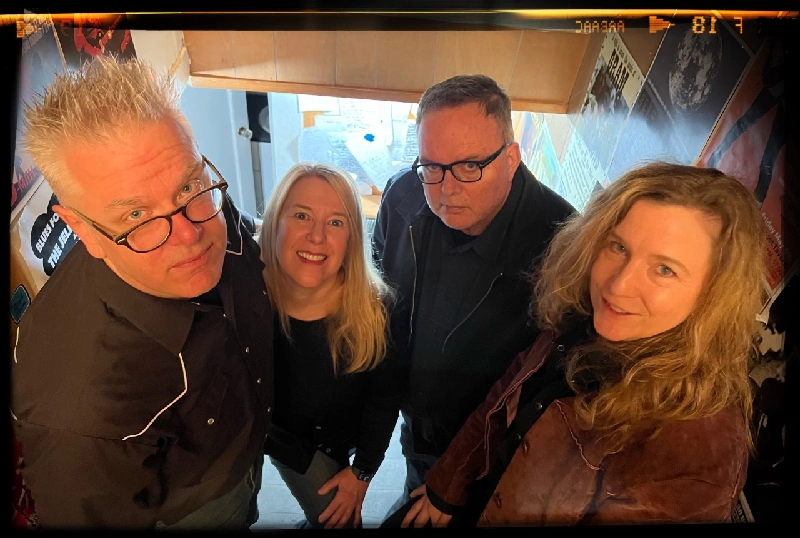
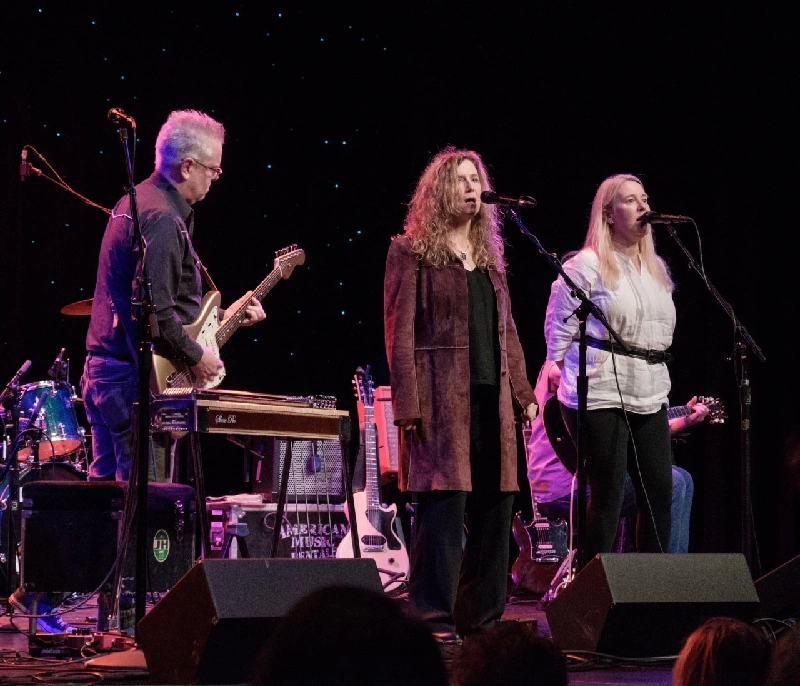
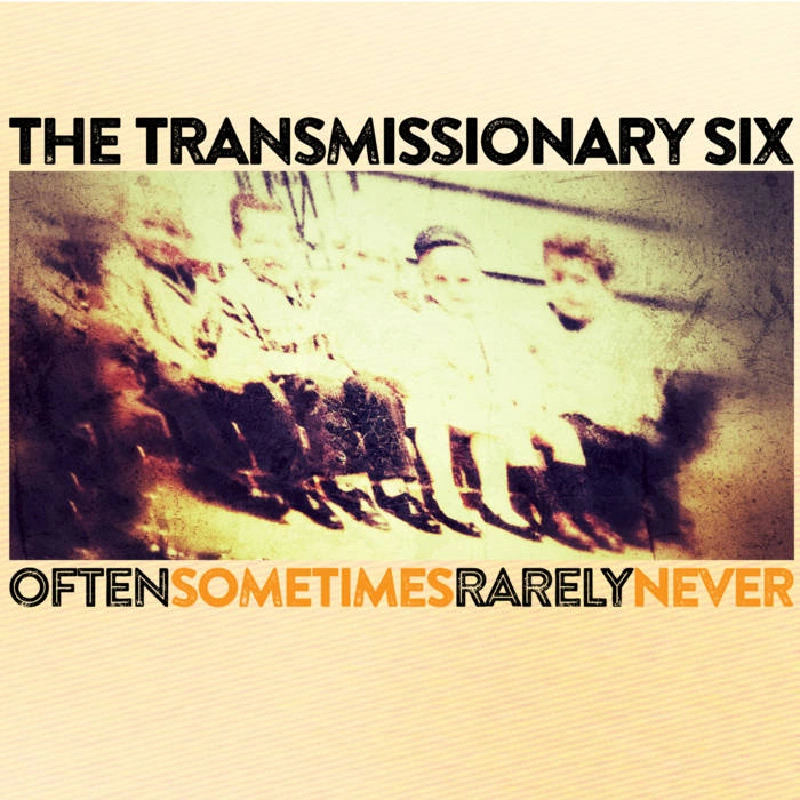
intro
In the first part of a two part interview, both parts which we are running consecutively, guitarist Paul Austin talks to John Clarkson about the reformation of his band The Transmissionary Six after a decade-long absence, and their new album, 'Often Sometimes Rarely Never'.
interviews |
|
Interview with Paul Austin Part 2 (2023) |
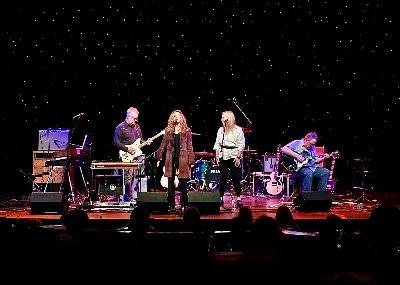
|
| In the second part of our interview with guitarist Paul Austin, John Clarkson talks to him about songwriting with Robert Fisher from Willard Grant Conspiracy, Chris Eckman from The Walkabouts and Terri Pearson from The Transmissionary Six, and The Transmissionary Six's unusual new videos. |
| Interview with Paul Austin and Terri Moeller (2003) |
| Interview with Paul Austin (2002) |
reviews |
|
Cosmonautical (2008) |
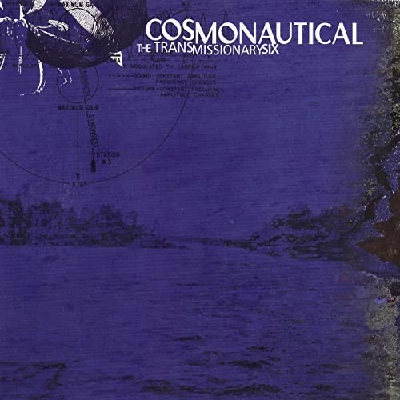
|
| Uplifting and epic-sounding chamber pop on fifth album from previously melancholic Seattle-based band the Transmissionary Six, which is their most accessible album to date |
| Radar (2006) |
| Get Down (2005) |
| Go Fast for Cheap (2003) |
| Desoto (2002) |
| Transmissionary Six (2002) |
most viewed articles
current edition
Deb Googe and Cara Tivey - InterviewJack Frost - As Seen on TV
Nils Petter Molvaer - El Molino, Barcelona, 24/4/2025
John McKay - Interview
Editorial - July 2025
Robert Forster - Interview
When Rivers Meet - Waterfront, Norwich, 29/5/2025
Kruder and Dofmeister - Paral-lel 62, Barcelona, 27/4/2025
Skunk Anansie - Old Market, Brighton, 16/5/2025
Yardbirds - Des Plaines Theater, Des Plaines, 18/4/2025
previous editions
Boomtown Rats - Ten Songs That Made Me Love....Heavenly - P.U.N.K. Girl EP
Oasis - Oasis, Earl's Court, London, 1995
Loop - Loop / Godflesh - Heaven, London, 4/6/2014
Super Furry Animals - Ten Songs That Made Me Love...
Brad Elvis - Interview
Serge Gainsbourg - Ten Songs That Made Me Love...
Not Forgotten Girl - Interview
Heaven 17 - Interview
Joe Perry (Aerosmith) - Interview
most viewed reviews
current edition
Davey Woodward - Mumbo in the JumboVultures - Liz Kershaw Session 16.06.88
Billy Nomates - Metalhorse
HAIM - I Quit
Vinny Peculiar - Things Too Long Left Unsaid
Peter Doolan - I Am a Tree Rooted to the Spot and a Snake Moves Around Me,in a Circle
Pulp - More
Garbage - Let All That We Imagine Be The Light
Morcheeba - Escape The Chaos
Little Simz - Lotus
Pennyblackmusic Regular Contributors
Adrian Janes
Amanda J. Window
Andrew Twambley
Anthony Dhanendran
Benjamin Howarth
Cila Warncke
Daniel Cressey
Darren Aston
Dastardly
Dave Goodwin
Denzil Watson
Dominic B. Simpson
Eoghan Lyng
Fiona Hutchings
Harry Sherriff
Helen Tipping
Jamie Rowland
John Clarkson
Julie Cruickshank
Kimberly Bright
Lisa Torem
Maarten Schiethart